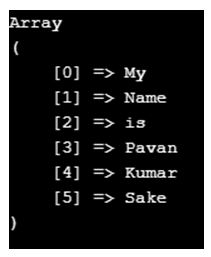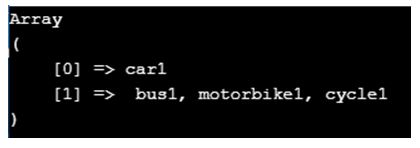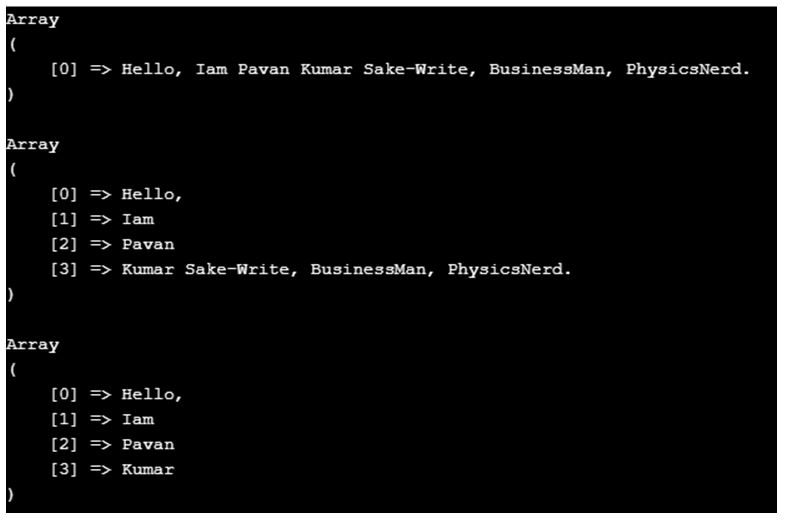PHP 爆炸()
PHP编程语言的explode()函数是一个内置函数,它有助于将一个字符串分割成许多不同的字符串。 explode() 函数有助于根据字符串的分隔符分割字符串,这意味着它将在分隔符字符出现/出现的任何地方分割字符串。这个explode()函数将返回一个数组,其中包含分割原始字符串后形成的字符串/字符串。 PHP的explode()函数通常只接受三个参数,将一个字符串分割成许多字符串元素并存储到一个数组中。就像把大绳子切成许多小绳子等等。
开始您的免费软件开发课程
网络开发、编程语言、软件测试及其他
语法:
explode(separator1, OriginalString1, No.ofElements1)
explode() 函数在 PHP 中如何工作?
PHP编程语言的explode()函数基于上述三个参数工作。它们是 Separator1、OriginalString1 和 No.ofElements1 参数。它的工作原理是借助explode()函数内的参数将字符串分割成更小的字符串。所有这些较小的字符串元素都存储在带有索引值的数组中,并且还基于explode()函数的参数。
参数说明:
explode() 函数的参数实际上接受三个参数,但其中只有两个参数是必需的,一个参数是可选参数。
1。 Separator1/Delimeter:PHP编程语言的Separator1参数实际上指定了字符串必须分割的一些临界点,这意味着每当在字符串元素中找到该字符串字符时,它就象征着结束一个数组元素的开头和另一个数组元素的开头。此 delimeter/Separator1 参数为必填参数。
2。 OriginalString1: PHP 编程语言的 OriginalString1 参数实际上是一个原始字符串,用于将一个字符串拆分为多个字符串,并且仅当字符串内部存在可用字符时才将其存储在数组中。这个OriginalString1参数也是必选参数。
3。 No.ofElements1/Limit: 该参数为可选参数,非强制。此参数有助于指定数组元素的数量。该参数可以是任意类型的整数。
可以是正整数、负整数或零整数。
- 正整数 (N):如果 No.ofElements1 参数以正整数值传递,则意味着数组将包含此数量的字符串元素。如果将元素与分隔符分隔后的元素数量将出现大于 N-1 个元素的值,但保持不变,最后一个字符串元素将是整个剩余的字符串。
- 负整数 (N):如果将负整数传递给 No.ofElements1 参数,则最后一个字符串元素 N 将被修剪,剩余的数组元素将仅作为一个字符串返回。
- 零整数:如果 No.ofElements1 参数以“零”值传递,则数组将仅返回一个字符串元素,即完整字符串(整个字符串)。当没有值传递给此 No.ofElements1 参数时,返回的数组将具有使用分隔符分隔字符串后形成的元素总数。
返回值类型:
explode() 函数的返回值类型是带有字符串列表的单个数组。
PHPexplode() 示例
下面给出的是提到的示例:
示例#1
这是考虑字符串之间的空格将单个字符串拆分为许多小字符串的示例。在下面的 PHP 标签示例中,创建了一个变量“$s1”,并将一个字符串句子分配给 $s1 变量。然后print_r()函数与其中的explode()函数一起使用。这里separator1/delimeter参数是空格“ ”,$s1是输入参数/原始字符串,然后这里没有提到任何参数。这里没有 limit/No.ofElements1 参数,因此字符串的分割没有限制。分割后,数组索引值内部将存储小字符串,并在 print_r() 函数的帮助下打印。
语法:
<?php
$s1 = "My Name is Pavan Kumar Sake";
print_r (explode(" ",$s1));
?>输出:

Example #2
This is the example of implementing with limit value “0”. At first, a variable “$stra” is created and this variable is also assigned with a string value ‘car1, bus1, motorbike1, cycle1’. Then print_r() function is made along with the explode() function in it. In the explode() function, “,” is used as separator1 parameter, $stra variable value is used as OriginalString1 Parameter and value “0” is used as No.ofElements1 Parameter. It is mentioned in the parameters description that if the No.ofElements1/Limit value is mentioned as 0 then the whole original string is considered as one single string array element. This will be printed as shown in the output. Then print function is used to print line break.
Syntax:
<?php
$stra = 'car1, bus1, motorbike1, cycle1';
print_r(explode(',',$stra,0));
?>Output:

Example #3
This is the example of implementing the string splitting with the help of the positive integer as No.ofElements1/limit Parameter. Here at first, a string variable called “$strab” is created with the string value ‘car1, bus1, motorbike1, cycle1’. Then print_r() function is used along with the explode() function along with the three parameters. Here “,” is the Separator1 parameter, “$strab” is the original string element which is nothing but OriginalString1 parameter, “2” is the No.ofElements1/limit Parameter. According to the parameters description, if the positive integer value is passed then n-1 array indexes values will splitted and stored and for N-1 index value, remaining whole string will be printed.
Syntax:
<?php
$strab = 'car1, bus1, motorbike1, cycle1';
print_r(explode(',',$strab,2));
?>Output:

Example #4
This is the program of implementing the string splitting function by using different type of integer values for No.ofElements1/limit parameter. So that one can know what actually happens for different parameters which are acting inside of the explode() function. For the first explode() function, the whole original string is considered as only one array element. Then value “4” is used for the second explode() function. For this, n-1=3 array indexes string values will be printed but for n-1 array index the whole remaining string will be printed. Then for the third explode() function, negative integer value(-N) is used. So at N array index values the string will be trimmed and will be printed starting from the 0 index value.
Syntax:
<?php
$Original_str1 = "Hello, IamPavan Kumar Sake-Write, BusinessMan, PhysicsNerd.";
print_r (explode (" ",$Original_str1, 0));
print "\n";
print_r (explode (" ",$Original_str1, 4));
print "\n";
print_r (explode (" ",$Original_str1, -3));
print "\n";
?>Output:

以上是PHP 爆炸()的详细内容。更多信息请关注PHP中文网其他相关文章!

热AI工具

Undresser.AI Undress
人工智能驱动的应用程序,用于创建逼真的裸体照片

AI Clothes Remover
用于从照片中去除衣服的在线人工智能工具。

Undress AI Tool
免费脱衣服图片

Clothoff.io
AI脱衣机

Video Face Swap
使用我们完全免费的人工智能换脸工具轻松在任何视频中换脸!

热门文章

热工具

记事本++7.3.1
好用且免费的代码编辑器

SublimeText3汉化版
中文版,非常好用

禅工作室 13.0.1
功能强大的PHP集成开发环境

Dreamweaver CS6
视觉化网页开发工具

SublimeText3 Mac版
神级代码编辑软件(SublimeText3)
 PHP与Python:了解差异
Apr 11, 2025 am 12:15 AM
PHP与Python:了解差异
Apr 11, 2025 am 12:15 AM
PHP和Python各有优势,选择应基于项目需求。1.PHP适合web开发,语法简单,执行效率高。2.Python适用于数据科学和机器学习,语法简洁,库丰富。
 PHP:网络开发的关键语言
Apr 13, 2025 am 12:08 AM
PHP:网络开发的关键语言
Apr 13, 2025 am 12:08 AM
PHP是一种广泛应用于服务器端的脚本语言,特别适合web开发。1.PHP可以嵌入HTML,处理HTTP请求和响应,支持多种数据库。2.PHP用于生成动态网页内容,处理表单数据,访问数据库等,具有强大的社区支持和开源资源。3.PHP是解释型语言,执行过程包括词法分析、语法分析、编译和执行。4.PHP可以与MySQL结合用于用户注册系统等高级应用。5.调试PHP时,可使用error_reporting()和var_dump()等函数。6.优化PHP代码可通过缓存机制、优化数据库查询和使用内置函数。7
 PHP和Python:比较两种流行的编程语言
Apr 14, 2025 am 12:13 AM
PHP和Python:比较两种流行的编程语言
Apr 14, 2025 am 12:13 AM
PHP和Python各有优势,选择依据项目需求。1.PHP适合web开发,尤其快速开发和维护网站。2.Python适用于数据科学、机器学习和人工智能,语法简洁,适合初学者。
 PHP行动:现实世界中的示例和应用程序
Apr 14, 2025 am 12:19 AM
PHP行动:现实世界中的示例和应用程序
Apr 14, 2025 am 12:19 AM
PHP在电子商务、内容管理系统和API开发中广泛应用。1)电子商务:用于购物车功能和支付处理。2)内容管理系统:用于动态内容生成和用户管理。3)API开发:用于RESTfulAPI开发和API安全性。通过性能优化和最佳实践,PHP应用的效率和可维护性得以提升。
 PHP的持久相关性:它还活着吗?
Apr 14, 2025 am 12:12 AM
PHP的持久相关性:它还活着吗?
Apr 14, 2025 am 12:12 AM
PHP仍然具有活力,其在现代编程领域中依然占据重要地位。1)PHP的简单易学和强大社区支持使其在Web开发中广泛应用;2)其灵活性和稳定性使其在处理Web表单、数据库操作和文件处理等方面表现出色;3)PHP不断进化和优化,适用于初学者和经验丰富的开发者。
 PHP和Python:解释了不同的范例
Apr 18, 2025 am 12:26 AM
PHP和Python:解释了不同的范例
Apr 18, 2025 am 12:26 AM
PHP主要是过程式编程,但也支持面向对象编程(OOP);Python支持多种范式,包括OOP、函数式和过程式编程。PHP适合web开发,Python适用于多种应用,如数据分析和机器学习。
 PHP与其他语言:比较
Apr 13, 2025 am 12:19 AM
PHP与其他语言:比较
Apr 13, 2025 am 12:19 AM
PHP适合web开发,特别是在快速开发和处理动态内容方面表现出色,但不擅长数据科学和企业级应用。与Python相比,PHP在web开发中更具优势,但在数据科学领域不如Python;与Java相比,PHP在企业级应用中表现较差,但在web开发中更灵活;与JavaScript相比,PHP在后端开发中更简洁,但在前端开发中不如JavaScript。
 PHP和Python:代码示例和比较
Apr 15, 2025 am 12:07 AM
PHP和Python:代码示例和比较
Apr 15, 2025 am 12:07 AM
PHP和Python各有优劣,选择取决于项目需求和个人偏好。1.PHP适合快速开发和维护大型Web应用。2.Python在数据科学和机器学习领域占据主导地位。






